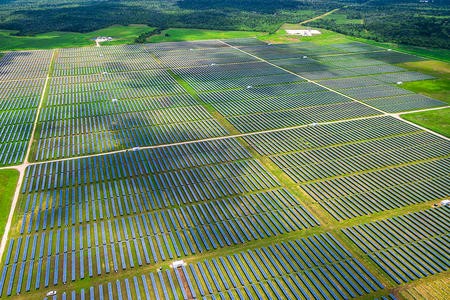
The Leech Lake solar garden to help residents in need, and it is part of the federal Low Income Home Energy Assistance Program (LIHEAP).
Source: Credit to Natural Resources Defense Council (NRDC)
| Project Name | Leech Lake Band of Ojibwe Community Solar Garden |
|---|---|
| Location | Cass Lake, Minnesota |
| Project Sponsor / Borrower | Leech Lake Band of Ojibwe |
| Program Areas |
|
| Value Capture Techniques | Solar Energy Use & Right-of-Way Use Agreements |
| Mode | Other: Solar Garden (Farm) |
| Description | To provide financial relief for the Leech Lake Band of the Ojibwe Tribe in central Minnesota, the Rural Renewable Energy Alliance (RREAL) built a community solar array with a grant from the McKnight Foundation and the Legislative-Citizen Commission on Minnesota Resources. The Federally recognized Ojibwe Tribe includes over 9,000 members on 865,000 acres, and 42 percent of the tribe members live below the poverty line. The electricity generated from the community solar garden is designated to recipients of Minnesota's Low-Income Home Energy Assistance Program. The 200-kilowatt (kW) solar array helps nearly 100 families in the tribe as an added resource to serve their energy needs. It consists of five ground-mounted, 40-kW arrays to make it visible to the community. The community solar program sells power to tribal buildings and utilities, and uses the revenue generated to fund payments for low-income households on the Leech Lake Reservation. Specifically, the 200-kW capacity system is expected to produce about 235 megawatt (MW) hours per year. While a portion of that electricity will feed directly into tribal buildings that the tribe will pay for, the rest will be sold to local utilities. The tribe receives an average of $0.09 per MW from the utilities (approximately $25,000 per year) and this money goes directly toward the local energy assistance provider, allowing additional households to use electricity. |
| Cost | $887,000 ($490,000 from a State-issued grant and remaining funds from the following foundations: Minnesota Environmental and Natural Resources Trust Fund, Initiative Foundation, Bush Foundation, Headwaters Foundation, McKnight Foundation, Carolyn Foundation, and Shakopee Mdewakanton Sioux Community) |
| Funding Sources |
|
| Project Delivery / Contract Method | Energy-savings performance, design-build |
| Private Partner |
|
| Project Advisors / Consultants | Rural Renewable Energy Alliance (RREAL) |
| Lenders | N/A |
| Duration / Status | Project was completed in July 2017. |
| Financial Status / Financial Performance | The $276,000 in annual energy savings will pay back the upgrades for the next 14 years for a net-zero project. The project was also aided by $490,000 in State grants in addition to donations from various foundations. |
| Innovations |
|
| Related Links / Articles |
|
| Contacts | John Vaughn |